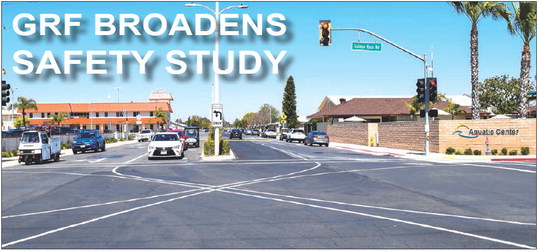SAFETY STUDY


GRF BOARD HIGHLIGHTS
GRF BROADENS
GRF Board considers signs, safety and fees
by Ruth Osborn
rutho@lwsb.com
Despite an unusually long parade of residents who took to the podium during the public comment period, the GRF Board concluded its monthly business meeting March 28 in record time, well before lunch.
At the start of the meeting, 18 speakers filed to the microphone, with the majority opposing a proposed policy change that would charge clubs for complicated meeting set-ups, among other slight changes.
The proposed policy stipulates that club and group setups that take longer than 30 minutes will be charged at the custodial hourly rate.
Most LW clubs will not be affected as a normal set-up, which generally takes 30 minutes or less, remains free of charge. Set-ups requiring more than a half-hour of custodial help would be charged. The cost is about $15 for the extra half hour.
Opposing the fee were representatives from a host of LW clubs, including Community Karaoke, Filipino Association of LW, golf clubs, Saturday Morning Dance and the Theater Club, among others.
“We were told amenities would be free once we paid the member fee,” said Kathy Engelhardt of Mutual 2. “It seems like double taxation,” agreed Mary Gray of Mutual 15.
No board action was taken because the policy revision is still in the 28-day review period. That is the time allotted to residents to comment on proposed changes before the final vote. All proposed changes to GRF policies are printed in LW Weekly Government section for resident review and comment. Residents can make their views known at a GRF Board meeting during the public comment period or by emailing letters to tiam@lwsb.com. The GRF Board approved Recreation Policy 70-1411-1 on Feb. 28, and it will be on the agenda for a final vote at the April 25 meeting.
In other meeting highlights: Signal Phasing at St. Andrews & Golden Rain On the recommendation of the Physical Property Committee, the GRF Board approved a funding request to broaden a traffic study for the intersection of Golden Rain Road and St. Andrews Drive. The community’s only signal light is located at that busy intersection.
On July 6, the Physical Property Committee evaluated proposals to conduct a traffic analysis of the intersection. The committee recommended— and the board subsequently approved— Stantec Consulting to conduct the survey at a cost not to exceed $9,954, plus a $1,000 for unexpected contingencies.
The original focus of the study was dedicated left-turnonly phasing on the north-south streets. After further consideration, the Physical Property Committee decided that the study should be expanded to include a review of “vehicles, pedestrians and protected leftturn phasing on all approaches.”
Stantec will study the impacts and benefits of eliminating all left-turn conflicts. It will also prepare a concept plan identifying signing/striping, traffic signal phasing and other improvement recommendations, along with an engineer’s opinion of probable construction costs.
The change order approved March 28 added $4,581 to the original cost of $9,954 for a total of about $14,535.
Implementing heightened safety measures at the intersection is expected to lessen the GRF’s future costs for liability insurance and litigation expenses.
Recreational Vehicle Lot Signage After a protracted discussion, the GRF Board voted 12-4, with one abstention, to approve two new signs for the newly refurbished RV Lot. At issue was the design of the sign, the number of signs to install and cost.
Last month, the Architectural Review Design Committee recommended the installation of two 2x9-foot signs on either side of the RV lot entrance for a total of $2,650. The signs say “Recreation Vehicle Lot” with the text framed on one side with the GRF wave and sun logo, similar to the sign at the GRF Aquatic Center.
There is currently no signage at the RV Lot.
GRF Director Edward Jablonsky of Mutual 11 opposed the design of the sign, contending it would be hard to read and that the signs were too expensive. He reasoned that further study was needed given the lack of urgency.
GRF Director Donna Gambol of Mutual 1 questioned the number of signs: “I don’t see why we need two signs. One sign will do it. We have one sign at the Aquatic Center, and everyone can find the pool.”
“People who use the RV lot know where it is,” said GRF Treasurer Phil Friedman of Mutual 15. “I see no reason to put two signs up.”
But others differed. “It is urgent,” said GRF Director Leah Perrotti of Mutual 1. “It’s the frosting on the cake. It’s finishing a project that started several years ago.”
“Signage gives consistency to the community,” said GRF Corporate Secretary Carol Levine of Mutual 10.
“I’m kind of amazed that we’re going crazy over $2,650. The capital dollars are there. I’ll vote to put the sign in,” said GRF Director Carol Damoci of Mutual 12 right before the vote was taken. Point-of-Sale Equipment Purchase At the recommendation of the Finance Committee, the board approved the purchase of seven point-of-sale terminals. Five will replace obsolete equipment. GRF is switching from NCR to SquarePOS, which provides a safe and secure way to take credit card payments. The Recreation and News departments already use Square for credit card processing.
Square terminals will also be installed at Copy and Supply, Physical Propery, Stock Transfer and Purchasing. Each setup will cost about $1,400 for a total of $9,800.
Each transaction will incur a 2.6% transaction fee.
HomeWise Docs
The board voted to ratify a contract with HomeWiseDocs following the approval of a oneyear service contract with the HOA document service company in an executive session on Dec. 1. HomeWiseDocs specializes in providing homeowners’ associations with a streamlined process for the ordering and delivery of resale and lender documents as well as condo/ HOA closing documentation.
GRF’s Stock Transfer office oversees and processes Leisure World’s real estate transactions to privately held escrow companies and real estate firms. GRF practice has been to offer those services for free, even though the private firm would be charged for those services for properties located outside Leisure World. Employing the service will allow the GRF to recover the staff time and costs it now expends in the escrow process.
GRF’s proposed contract with HomeWiseDocs does not require GRF to pay any money to the company, which charges a fee to each client firm or individual requesting a service related to the escrow process. GRF is expected to establish billing parameters that allow the GRF to recover its costs in facilitating the transfer process. Until those fee parameters are set, potential cost recovery income cannot be accurately projected.
The board voted to ratify the HomeWiseDocs contract at no net cost.
Reorganization of GRF Committees At the recommendation of the GRF Administration Committee, the GRF Board of Directors voted 12-5 to try a new committee structure, cutting 10 GRF standing committees to four and reorganizing GRF departments into one of the four new committees—Administration, Facilities, Member Services and Operations.
Over the years, the number of GRF standing committees has grown, with each committee requiring increasing investments of time from GRF board directors and staff.
Board members, who are all volunteers, research issues, attend meetings and help prepare materials for consideration by the full board of directors.
Each of the 10 standing committees is staffed by a recording secretary, who must meet a host of time-consuming legal requirements, including noticing meetings, preparing agendas, and recording and posting meeting minutes.
Between two and seven senior department directors and managers attend each meeting. The executive director generally attends every standing committee meeting, and a number of senior administrators perform such duties for multiple committees during a single month.
By streamlining the committee process, staff can undertake tasks of higher value to the community, according to GRF Director William Thompson, who was instrumental in developing the new strategy, along with GRF President Marsha Gerber and GRF Treasurer Phil Friedman.
An analysis of staff/hour commitments to the GRF’s current committee structure indicates the new committee structure will save approximately 53% of the staff time currently committed to committee meetings. This recommitted staff time, priced out within different tiers for currently established clerical and administrative salaries, is valued at about $38,000 over the 11 months the standing committees routinely meet each year.
The proposed restructuring does not contemplate staffing or protocol changes for the GRF’s monthly board of directors meeting. The restructure also does not propose changing GRF staffing for governance activities involving the Mutual corporations, the Mutual Presidents Council or the GRF/Mutual Associates Panel.
The staff-cost analysis presumes that each of the four remaining meetings will, on average, be approximately 40% longer than current committee meetings. Under the plan, GRF Executive Director Jessica Sedgwick will continue to attend all standing committees but anticipates staff at the department director and manager levels will report to only a single committee.
Some board members opposed the four-committee structure: “Inevitably, there will be problems. Instead of rushing into four committees, I suggest getting together this month and reaching a board consensus,” said GRF Director Lee Melody, who represents Mutual 14. GRF Director Sandy Geffner agreed, saying the idea needed more planning.
“What is the worst thing that can happen?” countered GRF Director Damoci. “We try four, and it doesn’t work. It doesn’t really affect anything,” she said, adding that more committees could be added if necessary.
GRF Director Levine agreed: “If we start with four and have to go to five, we can. We’ve done it in the past.”
GRF Director Friedman pointed out that “a great deal of thought and planning have gone into this. Staff has been split into four departments, and that will align with the committee structure. If we don’t start somewhere, we will be debating this forever.”
A majority of the board agreed and approved the proposed change to Policy 30-50201, Organization of the Board, and established a target date of June 16 for the reorganization to start. The new structure will be reviewed after three months.




